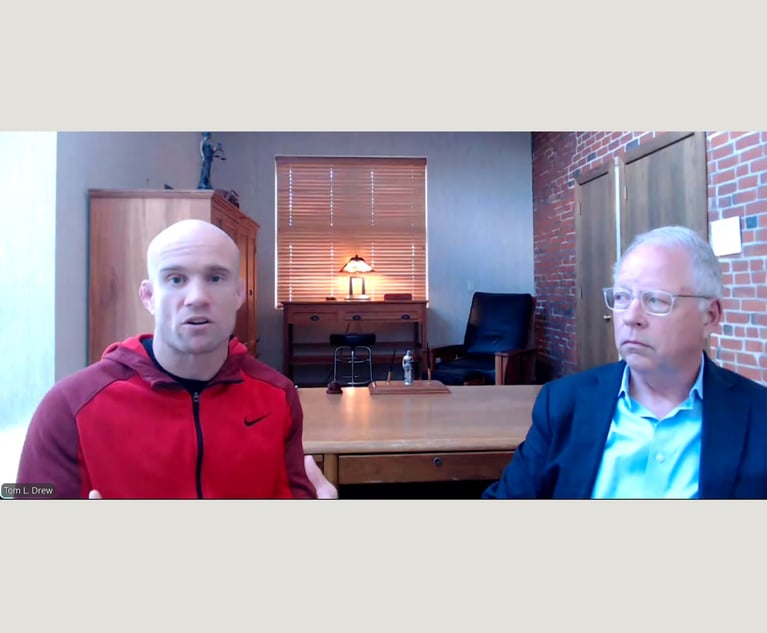And the LOTW Runners Up...
Honorable mention goes to lawyers from Kirkland & Ellis; Mintz Levin; Sidley Austin; Baker Botts and Pryor Cashman.
November 22, 2019 at 12:43 PM
3 minute read
Our runners up for Litigator of the Week include Kirkland & Ellis partners Erin Murphy and Rick Godfrey, who drove home a victory for General Motors LLC before the U.S. Court of Appeals for the Second Circuit.
The three-judge panel unanimously held that "New GM" did not assume liability for punitive damages when it purchased most of the assets of General Motors Company ("Old GM") following Old GM's bankruptcy. Had the court gone the other way, it could have cost New GM millions or billions in nationwide litigation over defective ignition switches in 2.6 million older recalled cars, as well as all other accident cases involving Old GM vehicles in general.
Mintz Levin's Peter Biagetti scored a win for Wynn Resorts, which faced a billion-dollar claim by Sterling Suffolk Racecourse in a suit alleging RICO violations plus tortious interference with contract and business relations. Biagetti led a multi-firm team in getting the case, which was filed in U.S. District Court for the District of Massachusetts, dismissed with prejudice for failure to state a claim.
Sidley Austin's Jim Ducayet, Duston McFaul and Andy O'Neill came through in a literal bet-the-company win for Legacy Reserves Inc. following a six-day trial before U.S. Bankruptcy Court for the Southern District of Texas. Over the objection of the Unsecured Creditors' Committee (represented by Brown Rudnick), the court approved Legacy's Chapter 11 Plan of Reorganization.
The result? About $1 billion of Legacy's debt will be eliminated and an infusion of $256.3 in new capital from backstopped equity commitments and a rights offering can proceed.
Baker Botts litigation partner Jonathan Shapiro prevailed at trial for client Grupo Flor—an outcome that proves newly-legal cannabis companies can win before a jury. After testimony by cannabis cultivators, manufacturers, distributors and industry experts and professionals, a jury in Monterey County, California rendered a verdict in favor of Grupo Flor in a dispute with its former landlord.
Frank Scibilia, Benjamin Semel, Donald Zakarin and Mona Simonian of Pryor Cashman successfully represented the Mechanical Licensing Collective—a new licensing collective created by the Music Modernization Act to collect and distribute royalty payments from digital services to songwriters and publishers.
Music streaming services including Spotify and Apple agreed to pay $33.5 million to get the collective up and running, and then $28.5 million for the first year after the collective's formal launch in 2021.
This content has been archived. It is available through our partners, LexisNexis® and Bloomberg Law.
To view this content, please continue to their sites.
Not a Lexis Subscriber?
Subscribe Now
Not a Bloomberg Law Subscriber?
Subscribe Now
NOT FOR REPRINT
© 2024 ALM Global, LLC, All Rights Reserved. Request academic re-use from www.copyright.com. All other uses, submit a request to [email protected]. For more information visit Asset & Logo Licensing.
You Might Like
View All

Helping Lawyers Move Away from ‘Grinding’ and Toward a ‘Flow’

Why Litigation Demand Might Break Firms’ Boom-and-Bust Cycle
Law Firms Mentioned
Trending Stories
- 1Cars Reach Record Fuel Economy but Largely Fail to Meet Biden's EPA Standard, Agency Says
- 2How Cybercriminals Exploit Law Firms’ Holiday Vulnerabilities
- 3DOJ Asks 5th Circuit to Publish Opinion Upholding Gun Ban for Felon
- 4GEO Group Sued Over 2 Wrongful Deaths
- 5Revenue Up at Homegrown Texas Firms Through Q3, Though Demand Slipped Slightly
Who Got The Work
Michael G. Bongiorno, Andrew Scott Dulberg and Elizabeth E. Driscoll from Wilmer Cutler Pickering Hale and Dorr have stepped in to represent Symbotic Inc., an A.I.-enabled technology platform that focuses on increasing supply chain efficiency, and other defendants in a pending shareholder derivative lawsuit. The case, filed Oct. 2 in Massachusetts District Court by the Brown Law Firm on behalf of Stephen Austen, accuses certain officers and directors of misleading investors in regard to Symbotic's potential for margin growth by failing to disclose that the company was not equipped to timely deploy its systems or manage expenses through project delays. The case, assigned to U.S. District Judge Nathaniel M. Gorton, is 1:24-cv-12522, Austen v. Cohen et al.
Who Got The Work
Edmund Polubinski and Marie Killmond of Davis Polk & Wardwell have entered appearances for data platform software development company MongoDB and other defendants in a pending shareholder derivative lawsuit. The action, filed Oct. 7 in New York Southern District Court by the Brown Law Firm, accuses the company's directors and/or officers of falsely expressing confidence in the company’s restructuring of its sales incentive plan and downplaying the severity of decreases in its upfront commitments. The case is 1:24-cv-07594, Roy v. Ittycheria et al.
Who Got The Work
Amy O. Bruchs and Kurt F. Ellison of Michael Best & Friedrich have entered appearances for Epic Systems Corp. in a pending employment discrimination lawsuit. The suit was filed Sept. 7 in Wisconsin Western District Court by Levine Eisberner LLC and Siri & Glimstad on behalf of a project manager who claims that he was wrongfully terminated after applying for a religious exemption to the defendant's COVID-19 vaccine mandate. The case, assigned to U.S. Magistrate Judge Anita Marie Boor, is 3:24-cv-00630, Secker, Nathan v. Epic Systems Corporation.
Who Got The Work
David X. Sullivan, Thomas J. Finn and Gregory A. Hall from McCarter & English have entered appearances for Sunrun Installation Services in a pending civil rights lawsuit. The complaint was filed Sept. 4 in Connecticut District Court by attorney Robert M. Berke on behalf of former employee George Edward Steins, who was arrested and charged with employing an unregistered home improvement salesperson. The complaint alleges that had Sunrun informed the Connecticut Department of Consumer Protection that the plaintiff's employment had ended in 2017 and that he no longer held Sunrun's home improvement contractor license, he would not have been hit with charges, which were dismissed in May 2024. The case, assigned to U.S. District Judge Jeffrey A. Meyer, is 3:24-cv-01423, Steins v. Sunrun, Inc. et al.
Who Got The Work
Greenberg Traurig shareholder Joshua L. Raskin has entered an appearance for boohoo.com UK Ltd. in a pending patent infringement lawsuit. The suit, filed Sept. 3 in Texas Eastern District Court by Rozier Hardt McDonough on behalf of Alto Dynamics, asserts five patents related to an online shopping platform. The case, assigned to U.S. District Judge Rodney Gilstrap, is 2:24-cv-00719, Alto Dynamics, LLC v. boohoo.com UK Limited.
Featured Firms
Law Offices of Gary Martin Hays & Associates, P.C.
(470) 294-1674
Law Offices of Mark E. Salomone
(857) 444-6468
Smith & Hassler
(713) 739-1250







